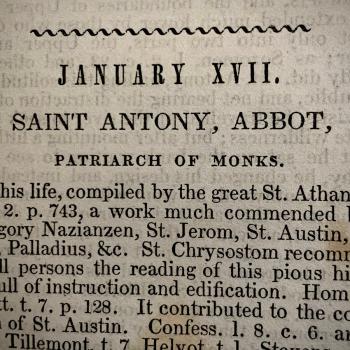Article 11 of the Treaty of Tripoli, a 1797 agreement between the United States and Tripoli, a Muslim nation located on the Barbary Coast of northern Africa, specifically states: "The Government of the United States of America is not, in any sense, founded on the Christian religion." The treaty was necessary because Barbary pirates, under the sanction of Tripoli, were capturing American ships and selling crew members into slavery. Any nation that wanted to trade freely in the region was forced to negotiate a peace treaty with the Barbary States, which usually included some kind of monetary tribute.
The American negotiators of this treaty did not want the religious differences between the United States and Tripoli to hinder attempts at reaching a trade agreement. Claiming that the United States was not "founded on the Christian religion" probably made negotiations proceed more smoothly. But today this brief religious reference in a rather obscure treaty in the history of American diplomacy has played a prominent role in the debate over whether the United States was founded as a Christian nation. It has become one of the most deadly arrows in the quiver of those who oppose the idea that the country was founded on Christian principles.
If the Treaty of Tripoli is correct, and the United States was not "founded on the Christian religion," then someone forgot to tell the American people. The words of the Treaty of Tripoli can hardly be reconciled with the way that most politicians, clergy, educators, and other writers perceived the United States over the course of the next two hundred years. The idea that the United States is a "Christian nation" has always been central to American identity.
For example, 19th-century history textbooks extolled the virtues of a Christian America by chronicling the way that God orchestrated events in history, including the founding of the British colonies, the American Revolution, or even things as specific as the 1793 yellow fever epidemic in Philadelphia. Emma Willard's History of the United States (1826) describes the "wonderful coincidence of events" that led to the death of Native Americans. Willard's text teaches school children that God eliminated large numbers of Indians in order to pave the way for Christian civilization. She writes: "the pious in heart will delight to recognize and acknowledge a superintending Providence, whose time for exchanging, upon these shores, a savage for a civilized people, had now fully come."
During the Civil War, both the Union and the Confederacy claimed to be Christian nations. In 1858, former Massachusetts Senator Rufus Choate put it this way: "God wills our national life." It was the responsibility of citizens to work hard at keeping this "UNITED, LOVING AND CHRISTIAN AMERICA" together at all costs. The idea that God favored a strong national union of Christians could be found in many of the sermons of the day. Horace Bushnell, a liberal Protestant, wrote that "Civil Government" must be "accepted as a kind of Providential creation." A more conservative Presbyterian clergyman named Albert Barnes added, "Government is to be regarded as a Divine appointment, and as deriving its authority from God."
Meanwhile the Confederates were quick to remind their northern counterparts that unlike the United States Constitution, the Constitution of the Confederate States of America made it very clear in its preamble that the Southern secessionists were "invoking the favor and guidance of Almighty God" in the process of ordaining their government. One Southern clergyman, Benjamin Morgan Palmer, blasted the "perilous atheism" of the United States Constitution and called the Confederate Constitution "a truly Christian patriot's prayer." After the War some Northern clergy, clearly bothered by the "godless" nature of the U.S. Constitution, would form a national organization to lobby for an amendment proclaiming that the United States was a Christian nation.
In the early 20th-century, as Fundamentalists and progressive Protestants battled for control of Protestant denominations in the so-called "Fundamentalist-Modernist" controversy, both groups defended the idea that the United States was a Christian nation. Fundamentalists such as Billy Sunday and William Jennings Bryan fought valiantly to curb the consumption of alcohol and end the teaching of Darwinism in schools as part of a crusade to Christianize the nation. Liberal Protestants, such as those defenders of the Social Gospel, thought that by advancing a program of justice and love aimed at America's social problems the United States, to quote social gospeler Walter Rauschenbusch, would "be recognized fully as a Christian nation."
As the 20th-century progressed, evangelicals, mainline Protestants, and Catholics worked hard at building a Christian civilization in America. Though these groups differed on the best way to cultivate such a civilization, they were united in the fact that the United States was indeed a Christian nation. Similarly, most of the leaders of the Civil Rights movement believed that their mission to end Jim Crow segregation was connected to the development of a Christian society in America. In his famous Letter from a Birmingham Jail, Martin Luther King Jr. reminded the white clergy of Birmingham that his crusade was meant to defend "what is best in the American Dream and for the most sacred values in our Judeo-Christian heritage, thereby bringing our nation back to those wells of democracy which were dug deep by the founding fathers in their formulation of the Constitution and the Declaration of Independence."
In the end, it is the task of theologians and church leaders to decide whether or not the close links between Christianity and national identity have been good for the nation and, perhaps more importantly, good for the Church. It is the task of historians to tell us whether the way that Americans in the 19th and 20th centuries understood their country as a Christian nation best reflects the beliefs of the founding fathers at the time of the American Revolution. But one thing is for sure -- the members of today's Christian Right who argue that the United States is a Christian nation have a good portion of American history on their side.
12/8/2010 5:00:00 AM





